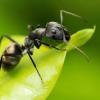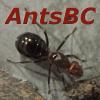Overview:
In 2014 and 2015, byFormica developed and sold a product by the name of Formula Blue 100. It consisted of a user-prepared agar gel ant food whose composition was based on the Dussutour-Simpson synthetic diet as cited in scientific literature. Specifically, it contained protein from whey and casein (both of which are milk products), whole egg powder, sugar, and vitamins.
The intent was to make feeding easier and more reliable by having a synthetic source of protein and carbohydrates that could serve as a nutritious food for the development of multiple species of ants kept in captivity. While the product was sold on Amazon, the reviews and user feedback elsewhere were very favorable, and many species of ants appeared to be receptive to it.
Why byFormica Stopped Selling the Product:
After over 18 months of research, I came to the conclusion that while ants would lick the gel and their larvae would often be filled with the blue food, ants generally failed to thrive when fed the diet exclusively, or nearly exclusively. Other scientific literature, preceding my own observations, came to the same conclusion: brood development and production would dwindle for colonies fed this diet.
Gavilanez-Slone J. M. and Porter S. D. 2013. Laboratory fire ant colonies (Solenopsis invicta) fail to grow with Bhatkar diet and three other artificial diets. Insect. Soc. (2014) 61:281–287
"While the house crickets and sugar water diet produced rapidly growing colonies; the Dussutour and predator diets with their sugar water supplements both failed to produce rapid growth normally seen in healthy colonies. By the end of the 6-week test, the brood to worker ratios for the cricket, predator and Dussutour diets were 1.2, 0.20, and 0.14 respectively. Colonies receiving the two artificial diets contained some larvae but very few pupae, indicating a developmental problem."
Obviously, many ant keepers didn't feed their ants Formula Blue 100 exclusively. But some may have. And so the people who continued to feed their ants other natural foods may have never noticed that the product wasn't effectively doing very much, as their ants may have continued to develop normally.
Unanswered Questions:
But why would a food, presumably containing all the macro- and micro-nutrients ants need to grow, not allow ants to thrive?
One theory may be that there may have been a micro-nutrient deficit in the diet—some trace vitamin or mineral missing that the ants needed. Another theory may be that foods containing both protein and sugar don't allow the ants to separate out the proper ratio of macro-nutrients they need to provide for the various colony members during different stages of development. Finally, another theory may be that the large, insoluble protein chains of whey and casein may not be able to be broken down or digested by ants in a way that they can metabolize.
Whatever the answer, it is clear from simple empirical observation, that there is a disparity between the ingredients in terms of how receptive the ants are to each on their own. For example, most omnivorous ants are highly receptive to sugar. Sometimes, ants are receptive to whole egg, although they tend to simply break it into pieces and lick it (maybe the fats or minerals?). In contrast, ants are not usually receptive to whey or casein protein mixed with water and nothing else. Nor are ants receptive to "amino acid" liquids which are mentioned in some recipes on the internet.
Therefore, I draw the conclusion that ants were mostly attracted to Formula Blue 100 due to the presence of sugar. Without the sugar, most ants wouldn't touch it.
Conclusion:
Despite Formula Blue 100 being a best-selling product with very good reviews, and something that customers continue to request and ask about nearly 4 years after it was discontinued, I made the decision to stop selling it at the end of 2015, as I had come to the determination that I was unable to meet my original objective of providing a food that allowed ant colonies to grow, and that the composition and assumptions made were fundamentally flawed.
Buyer Beware:
(Generic photo of products sold as "protein jellies" for ants)
Many otherwise reputable suppliers of ant keeping products and accessories continue to sell all-in-one diets combining carbohydrates and proteins with claims that the products are beneficial to ants. They continue this practice either out of ignorance, or simply because less sophisticated customers continue to demand the product, and so there is money to be made by exploiting serving those customers.
After all, ants may appear to be highly receptive to the food! But ants will also eat human waste if you mix a lot of sugar into it. Ants showing interest in a food is never a sign that the food is beneficial for the ants on its own. As such, I prefer to think these sellers are ignorant to the harm and confusion they are potentially causing by selling a product that likely serves no more of a nutritive benefit to ants than any standard sugar solution, yet is advertised to provide protein, vitamins, and minerals.
While I haven't personally tested each and every food on the market, based on my understanding of the science, I have developed a simple test to determine if a food is likely to benefit ants kept in captivity:
- Does the food omit the list of ingredients on the website and/or product label?
- Does the food claim to combine carbohydrates/sugars and protein?
- Does the food claim to provide ants with all the nutrients they need to grow and thrive?
- Does the food claim to be a supplement, marketed to complete or enhance a diet of regular foods like sugar water and insects?
If the answer is "Yes" to any of the above, DO NOT BUY THE PRODUCT.
It is my view that ant keepers should avoid all liquid or gel foods that claim to confer any benefit to the ants other than acting as a sugar source. There is NO KNOWN SYNTHETIC ANT FOOD that can definitively allow for the growth of ant colonies kept in captivity when fed exclusively. Nor will ants require or benefit from any type of "supplement" when fed a varied, natural diet of sugars and insects, seeds, or other items.
As for me, I will continue to consider practical and working alternatives to solving this extremely difficult problem, while being even more mindful that much of the work in scientific literature is short-term, and the results are not likely be replicated when translated to different species of ants kept in captivity with a queen and brood over a long period of time.
Edited by drtrmiller, December 11 2019 - 12:13 AM.


















